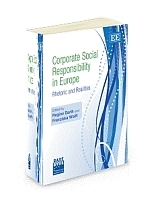Corporate Social Responsibility In Europe
Rhetoric and Realities
The acid test of corporate social responsibility (CSR) is simply this: does it
lead to positive impacts on society and the environment or is it just rhetoric? And if it
does lead to positive impacts, how can these be enhanced? This timely book tackles this
cutting-edge challenge by presenting empirical findings from a range of surveys and
in-depth case studies. These build on a new methodological and theoretical framework for
assessing and explaining the sustainability impact of CSR.
For selected sustainability issues – mitigation of climate change and chemical risk,
resource management in marine fisheries, promotion of gender equality and countering of
bribery – and within different European industries, the authors show that the rhetoric
of CSR is still stronger than its reality. They do so by investigating into CSR practices
which encompass the creation of a vision on CSR, its strategic and operative
implementation and its organisational and cultural embedding within companies and their
supply chains. The authors conclude that the reality of CSR is strong enough to allow for
some rhetoric. They name intra- and extra-company success factors for, and limits of,
producing sustainability impacts through CSR. Finally, they discuss its contribution to
achieving public policy goals and the governance paradigms that are necessary to make CSR
effective. The volume successfully combines a business and public policy perspective,
based on an interdisciplinary approach.
This book will be invaluable for both students and researchers interested in the effects
of CSR, and will prove a useful tool for policy-makers and CSR practitioners alike.
Edited by Regine Barth and Franziska Wolff,
Environmental Law and Governance Division, Öko-Institut, Germany
Contents:
Foreword
PART I: ANALYTICAL FRAMEWORK
1. Corporate Social Responsibility and Sustainability Impact: Opening up the Arena
Regine Barth and Franziska Wolff
2. A Framework for Assessing the Sustainability Impact of CSR
Jon Birger Skjarseth and Jorgen Wettestad
3. A Framework for Explaining the Sustainability Impact of CSR
Federica Vigano, Franziska Wolff and Daniele Nicolai
PART II: MAPPING CSR: SURVEY DATA ON SELECTED ISSUES IN FOUR SECTORS
4. Introduction to the Surveys
Katharina Schmitt
5. CSR in the European Oil Sector: A Mapping of Company Perceptions
Elin Lerum Boasson, Jorgen Wettestad and Maria Bohn
6. CSR in the European Fish Processing Industry: Not Just Fishing for Compliments
Katharina Schmitt and Franziska Wolff
7. CSR in the European Banking Sector: Evidence from a Survey
Federica Vigano and Daniele Nicolai
8. Driving on CSR: SMEs in the Automotive Supply Chain
Tamás Pálvölgyi, János Szlávik, Noémi Csigéné Nagypál, Miklós Füle and Mária
Csete
9. CSR Practices Across Four Sectors: A Synthesis of the Surveys
Katharina Schmitt
PART III: ASSESSING AND EXPLAINING THE SUSTAINABILITY IMPACT OF CSR: CASE
STUDY FINDINGS
10. Standardized CSR and Climate Performance: Why is Shell Willing, but Hydro
Reluctant?
Elin Lerum Boasson and Jorgen Wettestad
11. In Hunt for Sustainable Seafood: Sustainability Effects of CSR in Three Fish
Processing Companies
Franziska Wolff and Katharina Schmitt
12. CSR for Gender Equality: A New Approach for Dealing with Long-Standing
Inequalities? Insights from Two Banks
Irmgard Schultz
13. Banking on Integrity: CSR Helps Counter Bribery and Money Laundering in Two
Banks
Peter Wilkinson
14. CSR Effects Across Four Issue Areas: A Synthesis of the Case Studies
Franziska Wolff
PART IV: CSR AND PUBLIC POLICY
15. CSR and Public Policy: Mutually Reinforcing for Sustainable Development?
Franziska Wolff, Maria Bohn, Irmgard Schultz and Peter Wilkinson
16. Striking Oil? CSR and the EU Integration Processes: The Example of Hungary
Tamás Pálvölgyi, Noémi Csigéné Nagypál, János Szlávik, Hajnalka Csáfor and
Mária Csete
17. Rhetoric and Realities in CSR: Main Findings and Implications for Public
Policy and Research
Franziska Wolff, Regine Barth, Christian Hochfeld and Katharina Schmitt
References
Index
384 pages, Hardcover
Księgarnia nie działa. Nie odpowiadamy na pytania i nie realizujemy zamówien. Do odwolania !.


